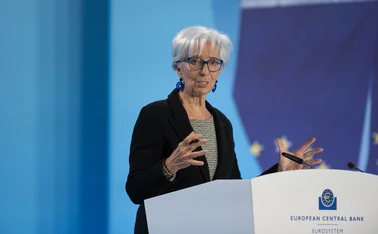
EM central banks in a bind as capital volatility set to worsen

Central banks in some of the world's biggest emerging markets are battening down the hatches in anticipation of a gathering storm of capital markets volatility provoked by the expected ‘tapering' of the Federal Reserve's programme of asset purchases.
Despite increased investor confidence that the tightening of monetary policy in advanced economies will be conducted slowly and be well signposted, volatility is expected to remain elevated and some emerging market currencies, such as the Indian rupee, the Indonesian rupiah and the Brazilian real, expected to come under further downward pressure during the coming months.
The minutes of the most recent meeting of the Federal Open Market Committee (FOMC), which sets monetary policy in the US, will be published tomorrow and scrutinised for any sign that, as is widely expected, the programme of quantitative easing is set to slow. But emerging market investors this week have been heading for the exits well ahead of an anticipated stampede.
Brazilian central bank governor Alexandre Tombini today issued a statement reassuring market participants that the Brazilian central bank stands ready to provide protection, in the form of currency hedging and liquidity provision where necessary. However, he followed this up with a warning against making one-way bets on the currency, noting that market interest rates are incorporating unjustified premia on the central bank's rate.
The Brazilian real started the year worth $0.49, but opened today at just $0.41. The Indian rupee today fell below 63 rupees to the dollar, having started the year some 14.5% stronger, at less than 55 rupees to the dollar. In Indonesia, a dollar now buys 10,300 rupiah compared with 9,630 at the beginning of the year – representing a 7% devaluation for the Indonesian currency.
Emerging market central banks risk hurting nascent economic recoveries in their efforts to support their currencies
Bank Indonesia last week held its interest rates steady, stating that a correction in the price of its currency would help move the economy on to a more sustainable external footing. "Looking forward," the central bank said, "Bank Indonesia expects the downward rupiah trend, which is still consistent with its fundamental conditions, to support efforts to expedite external rebalancing as well as to catalyse healthier economic growth."
The Reserve Bank of India (RBI), by contrast, has been searching its toolbox for ever more regulations to try and stem the decline in the value of the rupee. The latest move was a restriction on overseas investments by Indian companies and individuals, following the introduction of a new, regular auction of treasury bills designed to "contain volatility in the foreign exchange market". The RBI governor, Duvvuri Subbarao, conceded last month the central bank is "having to forfeit some monetary policy discretion to address external sector concerns".
Can markets avoid a 1994-esque ‘sudden stop'?
Fitch Ratings' latest fixed-income investor survey, published yesterday, found 73% of portfolio managers believe monetary policy tightening in advanced economies will be "timely and smooth, causing no threat to economic recovery" – but more than two thirds of them also said the winding down of quantitative easing poses the biggest risk to the global economic recovery, an all-time high since Fitch started asking that question in its quarterly survey in mid-2011.
The survey respondents were more fearful for emerging markets, where two thirds believed debt fund flows will be "volatile, reflecting QE exit uncertainty". Of the remainder, more investors expected flows to decrease due to greater concerns over political risk (21%), than believed they would increase, due to the "continued search for higher yielding assets" (13%).
Half of all survey respondents said emerging markets were overvalued, but Fitch said it believed "an improvement in credit fundamentals over the last decade should make emerging market sovereigns more resilient to a liquidity shock than in the past". However, the rating agency added, some emerging markets "are more vulnerable to volatile capital flows and higher interest rates due to factors including large external financing requirements, low foreign reserve buffers and high leverage".
Pablo Goldberg, global head of emerging markets research at HSBC, said today in a note that he expects global markets to avoid a ‘sudden stop', such as that seen in 1994, when a radical tightening of monetary policy in the US caused bond yields to soar in Latin America's emerging markets.
Goldberg said "the current communication policy from the US Fed should allow for markets to adjust more smoothly to an eventual tightening", adding that "forward guidance and open-ended QE… takes a lot of the surprise factor away from the US tightening cycle".
Moreover, he said, the quantitative easing being pursued by the Bank of Japan "should somewhat counterbalance" any tapering in the US. "This is particularly the case for Asia," he said.
Nevertheless, emerging market central banks risk hurting nascent economic recoveries in their efforts to support their currencies. The Central Bank of the Republic of Turkey today raised interest rates, saying: "The weakness in capital flows that started in May due to heightened uncertainty regarding the global monetary policies continues."
The 50-basis point interest rate hike, from a 7.25% overnight lending rate to 7.75%, comes despite the central bank's admission that inflation "is expected to start falling from August onwards".
In his note published ahead of the Turkish decision, Goldberg said: "In those places where currencies are more constrained, monetary conditions have begun to tighten. We are seeing this in Indonesia, India, Brazil and Turkey already. This pro-cyclical response will tend to add new headwinds to growth."
Only users who have a paid subscription or are part of a corporate subscription are able to print or copy content.
To access these options, along with all other subscription benefits, please contact info@centralbanking.com or view our subscription options here: http://subscriptions.centralbanking.com/subscribe
You are currently unable to print this content. Please contact info@centralbanking.com to find out more.
You are currently unable to copy this content. Please contact info@centralbanking.com to find out more.
Copyright Infopro Digital Limited. All rights reserved.
As outlined in our terms and conditions, https://www.infopro-digital.com/terms-and-conditions/subscriptions/ (point 2.4), printing is limited to a single copy.
If you would like to purchase additional rights please email info@centralbanking.com
Copyright Infopro Digital Limited. All rights reserved.
You may share this content using our article tools. As outlined in our terms and conditions, https://www.infopro-digital.com/terms-and-conditions/subscriptions/ (clause 2.4), an Authorised User may only make one copy of the materials for their own personal use. You must also comply with the restrictions in clause 2.5.
If you would like to purchase additional rights please email info@centralbanking.com







